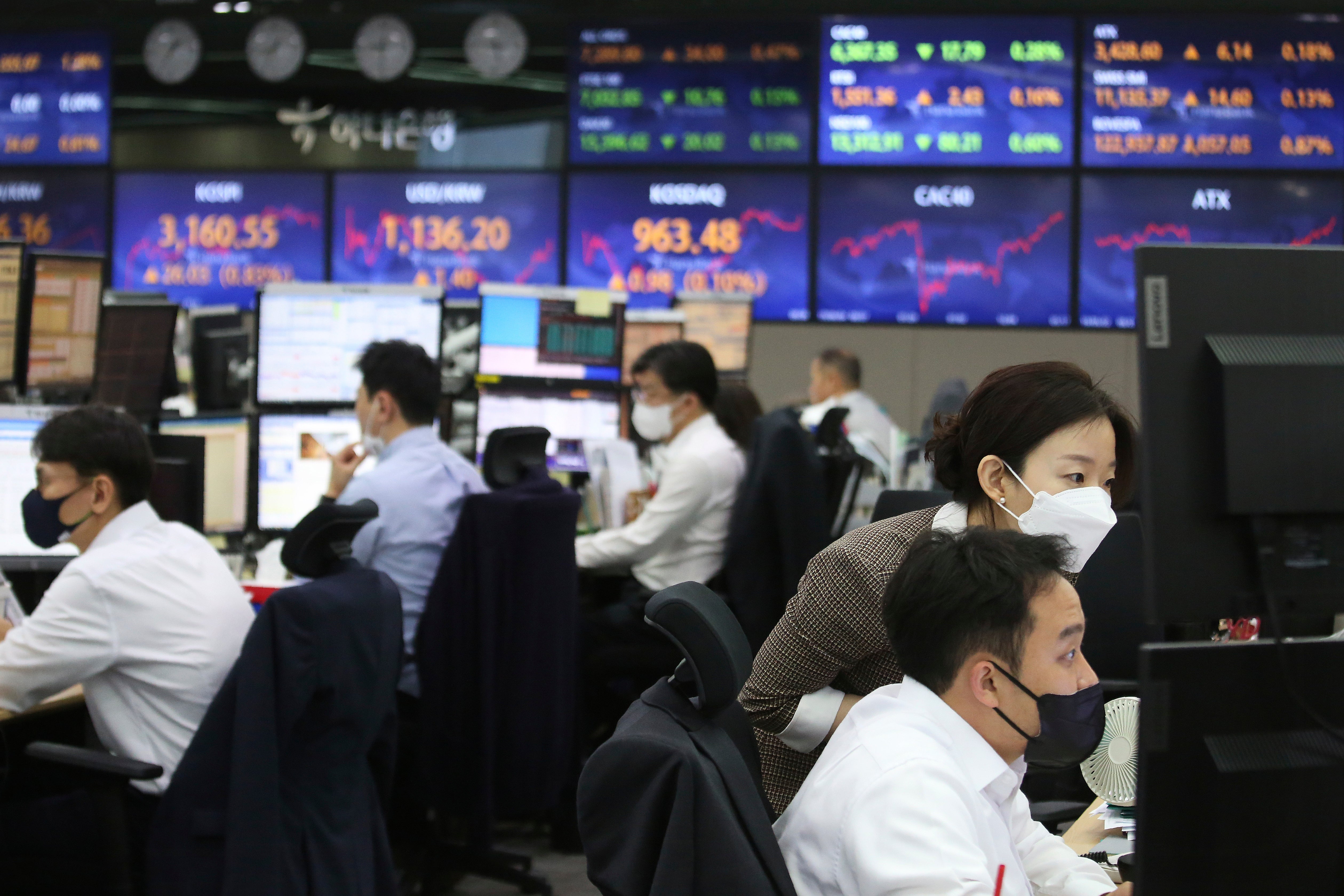Asia shares gain despite worsening pandemic, inflation fears
Asian shares have advanced as investors snapped up bargains after recent sell-offs spurred by a worsening of the pandemic in some countries

Your support helps us to tell the story
From reproductive rights to climate change to Big Tech, The Independent is on the ground when the story is developing. Whether it's investigating the financials of Elon Musk's pro-Trump PAC or producing our latest documentary, 'The A Word', which shines a light on the American women fighting for reproductive rights, we know how important it is to parse out the facts from the messaging.
At such a critical moment in US history, we need reporters on the ground. Your donation allows us to keep sending journalists to speak to both sides of the story.
The Independent is trusted by Americans across the entire political spectrum. And unlike many other quality news outlets, we choose not to lock Americans out of our reporting and analysis with paywalls. We believe quality journalism should be available to everyone, paid for by those who can afford it.
Your support makes all the difference.Asian shares advanced Tuesday as investors snapped up bargains after recent sell-offs spurred by a worsening of the pandemic in some countries.
Japan s benchmark Nikkei 225 surged 2.1% to finish at 28,406.84. South Korea s Kospi gained 1.2% to 3,172.73. Australia's S&P/ASX 200 added 0.6% to 77,066.00. Hong Kong's Hang Seng jumped 1.3% to 28,564.36, while the Shanghai Composite edged up 0.2% to 3,524.13.
Regional markets shrugged off data showing Japan’s economy contracted at 5.1% annual pace in the last quarter as numbers of new coronavirus cases surged. Analysts expected the results and don’t expect improvements in the situation anytime soon.
Although Asia so far has fared better in curbing COVID-19 infections, compared to the U.S., South and Central America and parts of Europe, worries are growing about the latest surges in cases in India, Japan, Thailand and other countries.
Yeap Jung Rong, market strategist at IG in Singapore, said Asian markets were seeking “to rebound from weakness over concerns on virus resurgences.”
U.S. stocks slipped on Monday, tacking more losses onto last week’s stumbles, as worries about inflation continue to dog Wall Street.
The S&P 500 dipped 0.3% to 4,163.29, with tech stocks and other former market darlings once again taking the brunt of the losses. The benchmark index is coming off a 1.4% weekly drop from its record high, which would have been even worse if not for a late rebound.
The Dow Jones Industrial Average fell 0.2% to 34,327.79, while the Nasdaq composite lost 0.4% to 13,379.05.
Most stocks in the S&P 500 fell, but pockets of strength helped limit the damage. Energy stocks jumped as the price of crude oil rose, while producers of metals and other raw materials also climbed. The Russell 2000 index of smaller stocks inched up 0.1% to 2,227.12.
Those were the latest back-and-forth eddies for a market swept up in worries about whether rising inflation will prove to be temporary or will endure. Prices are rising for everything from auto insurance to restaurant meals as the economy leaps out of last year's pandemic-induced coma.
The fear is that the Federal Reserve will have to dial back the extensive support it’s providing to markets if inflation persists. That includes record-low interest rates and the monthly purchase of $120 billion in bonds meant to goose the job market and economy.
Higher interest rates drag on most of the stock market, but they are particularly painful for stocks considered the most expensive and those bid up for profits expected far into the future.
That puts extra pressure on tech stocks and companies promising fast growth, which have led the market for years. Apple, Microsoft and Tesla were three of the heaviest weights on the S&P 500 Monday, falling between 0.9% and 2.2%.
Blowout profit reports from tech titans and much of the rest of corporate America have helped validate a huge rally in stocks. The economy is gaining momentum strengthen as COVID-19 vaccinations roll out, and the S&P 500 roared to an 11.3% gain in the first four months of the year. That’s a bigger gain than the market has had in half of the last 20 years.
For all the worries about inflation, many professional investors are echoing the Federal Reserve in saying that they expect rising prices to be “transitory.” Many analysts also expect strong profit growth for companies to continue as the economy and job market improve. That should help to support stock prices, though it may not give a big further boost after shares surged last year when profits cratered.
In energy trading, benchmark U.S. crude added 51 cents to $66.78 a barrel in electronic trading on the New York Mercantile Exchange. It picked up 90 cents to $66.27 on Monday. Brent crude, the international standard, rose 53 cents to $69.99 a barrel.
In currency trading, the U.S. dollar edged down to 109.11 Japanese yen from 109.21 yen late Monday. The euro cost $1.2181, up from $1.2153.